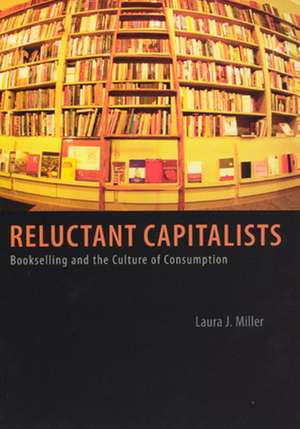Reluctant Capitalists: Bookselling and the Culture of Consumption
Autor Laura J. Milleren Limba Engleză Paperback – 21 iun 2007
Over the past half-century, bookselling, like many retail industries, has evolved from an arena dominated by independent bookstores to one in which chain stores have significant market share. And as in other areas of retail, this transformation has often been a less-than-smooth process. This has been especially pronounced in bookselling, argues Laura J. Miller, because more than most other consumer goods, books are the focus of passionate debate. What drives that debate? And why do so many people believe that bookselling should be immune to questions of profit?
In Reluctant Capitalists, Miller looks at a century of book retailing, demonstrating that the independent/chain dynamic is not entirely new. It began one hundred years ago when department stores began selling books, continued through the 1960s with the emergence of national chain stores, and exploded with the formation of “superstores” in the 1990s. The advent of the Internet has further spurred tremendous changes in how booksellers approach their business. All of these changes have met resistance from book professionals and readers who believe that the book business should somehow be “above” market forces and instead embrace more noble priorities.
Miller uses interviews with bookstore customers and members of the book industry to explain why books evoke such distinct and heated reactions. She reveals why customers have such fierce loyalty to certain bookstores and why they identify so strongly with different types of books. In the process, she also teases out the meanings of retailing and consumption in American culture at large, underscoring her point that any type of consumer behavior is inevitably political, with consequences for communities as well as commercial institutions.
In Reluctant Capitalists, Miller looks at a century of book retailing, demonstrating that the independent/chain dynamic is not entirely new. It began one hundred years ago when department stores began selling books, continued through the 1960s with the emergence of national chain stores, and exploded with the formation of “superstores” in the 1990s. The advent of the Internet has further spurred tremendous changes in how booksellers approach their business. All of these changes have met resistance from book professionals and readers who believe that the book business should somehow be “above” market forces and instead embrace more noble priorities.
Miller uses interviews with bookstore customers and members of the book industry to explain why books evoke such distinct and heated reactions. She reveals why customers have such fierce loyalty to certain bookstores and why they identify so strongly with different types of books. In the process, she also teases out the meanings of retailing and consumption in American culture at large, underscoring her point that any type of consumer behavior is inevitably political, with consequences for communities as well as commercial institutions.
Preț: 243.19 lei
Nou
Puncte Express: 365
Preț estimativ în valută:
46.54€ • 48.71$ • 38.73£
46.54€ • 48.71$ • 38.73£
Carte tipărită la comandă
Livrare economică 31 martie-14 aprilie
Preluare comenzi: 021 569.72.76
Specificații
ISBN-13: 9780226525914
ISBN-10: 0226525910
Pagini: 328
Dimensiuni: 152 x 229 x 23 mm
Greutate: 0.45 kg
Ediția:First Edition
Editura: University of Chicago Press
Colecția University of Chicago Press
ISBN-10: 0226525910
Pagini: 328
Dimensiuni: 152 x 229 x 23 mm
Greutate: 0.45 kg
Ediția:First Edition
Editura: University of Chicago Press
Colecția University of Chicago Press
Notă biografică
Laura J. Miller is assistant professor of sociology at Brandeis University.
Cuprins
Acknowledgments
1. Commercial Culture and Its Discontents
1. Commercial Culture and Its Discontents
2. From Dry Goods Merchant to Internet Mogul: Bookselling through American History
3. Providing for the Sovereign Consumer: Selecting and Recommending Books
4. Designing the Bookstore for the Standardized Consumer
5. Serving the Entertained Consumer: The Multifunction Bookstore
6. Bargaining with the Rational Consumer: Selling the Low-Cost Book
7. The Revolt of the Retailers: Independent Bookseller Activism
8. Pursuing the Citizen-Consumer: Consumption as Politics
Appendix: Ownership Histories of Major American Chain Bookstores
Notes
Bibliography
Index
Bibliography
Index
